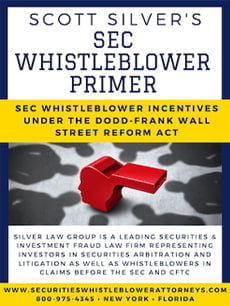Investor Claims
The financial services industry can be complicated—and seeking a redress of grievances is not an exception. There are resources out there for people who were defrauded by a financial services company, but they’re often unfamiliar to ordinary investors. That’s bad news for investors who have evidence of wrongdoing, but don’t know where to take it.
The Silver Law Group and the Law Firm of David R. Chase both focuses their practices on securities fraud, so we’re quite familiar with the different ways victims might seek justice. In this post, we’d like to highlight two: The whistleblower program of the U.S. Securities and Exchange Commission, and arbitration before the Financial Industry Regulatory Authority.
What They AreFINRA is a private nonprofit organization that was authorized by Congress to allow the financial industry to regulate itself (subject to SEC oversight). It licenses stockbrokers (who buy and sell securities for clients) and stock dealers (who buy and sell securities for an agency); and creates and enforces rules about the behavior of broker-dealers and companies.
Importantly, FINRA includes an arbitration program intended to settle disputes between investors and regulated entities. Arbitration is a substitute for going to court, but it has slightly different rules that allow it to work confidentially, more quickly, and at a lower cost. If you use FINRA arbitration, the decision may be binding and you will not be able to go to court.
The SEC’s Office of the Whistleblower is part of the government agency that regulates the financial industry. Created in 2011, it receives disclosures of wrongdoing in the financial industry and routes them to investigators. Whistleblowers may be victims of the fraud or insiders at the organizations committing the fraud, and their identities are protected as much as possible. If the investigation results in a financial penalty of more than $1 million, the whistleblower may be paid an award of 10 to 30 percent of the recovery.
Which to Use?If you believe you were defrauded by a financial services company, you may wonder whether it makes more sense to take your complaint to FINRA or the SEC whistleblower program. Both of these offices handle complaints like this, but there are important differences.
Using FINRA arbitration might make sense if:
- You’d like to recover your money from the business that defrauded you
- You’d like to be closely involved in the case
- You don’t care whether the company you’re accusing knows who you are
- You would prefer to keep the matter private
- You’d like to wrap it up relatively quickly (nine to 18 months, on average)
By contrast, the SEC whistleblower process might be best if:
- You believe the government should investigate the organization you’re accusing
- You believe that investigation could result in a large penalty, and you’d like a share of it
- You don’t mind being mostly uninvolved in the case
- You would like your identity kept secret
- You don’t mind if the case itself is public
- You don’t mind a longer process or believe there are many victims
A FINRA arbitration lawyer can handle all of the same tasks you’d expect in court, such as exchanging information with the other side and making arguments on your behalf. Before the SEC whistleblower office, an SEC whistleblower attorney can ensure that you make your disclosure in a way that maximizes the SEC’s interest—and your chances of a payout. In certain cases, it is possible to file a separate securities arbitration case and an SEC whistleblower claim.
The Silver Law Group Can HelpIf you know you have important information about financial fraud, but you’re not sure what to do with it, the Silver Law Group and the Law Firm of David R. Chase can help. Our practices are focused solely on securities fraud and other financial wrongdoing. Attorney Scott Silver has appeared in FINRA arbitrations throughout his career—as well as in state and federal courts—and wrote a well-received guide to the SEC whistleblower process. Attorney David Chase is a former SEC Enforcement Division lawyer who understands exactly how the agency makes its cases—and therefore how whistleblowers should present their information.
For a free, confidential meeting where we can discuss your situation and your options, call us at 800.975.4345 or send us a message online.
 Silver Law Group Home
Silver Law Group Home
